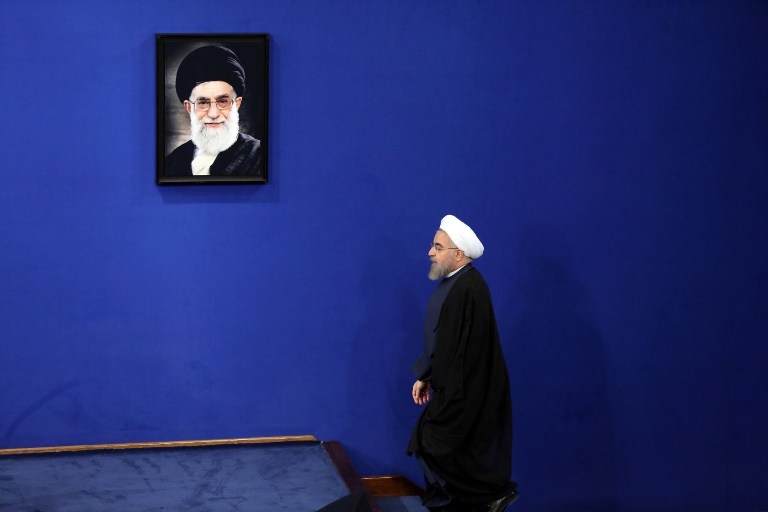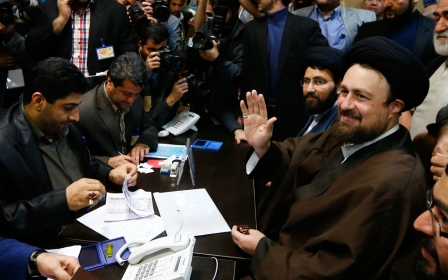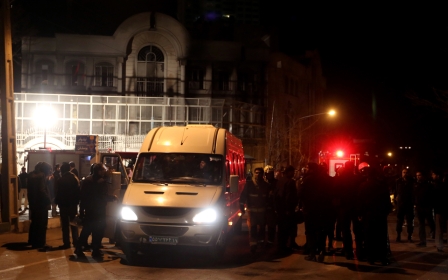The myth of hardline-pragmatic division in Iran

On 25 January, Iranian President Hassan Rouhani began a historic trip to Europe aimed at helping revive economic ties in the wake of the lifting of international sanctions on Iran as a result of the nuclear deal. This marks the first step in trying to restore trade between Iran and Europe to its pre-sanctions figure of around 28 billion euros from the current rate of €7.6bn.
The trip is also symbolically important because it marks Iran’s re-embrace by the international community. But this does not signal the beginning of political change in Iran. Iran’s outward pragmatism is mainly a tool to secure the power of the supreme leader and the Revolutionary Guards.
There is often talk about there being two divergent lines in Iran, a hardline one dominated by the Supreme Leader Ayatollah Ali Khamenei and the Revolutionary Guards and a pragmatic line represented by President Rouhani and the Ministry of Foreign Affairs. But far from the existence of two competing currents in Tehran, the two lines actually work harmoniously. Power in Iran remains firmly in the hands of the supreme leader, while Rouhani’s camp is useful for Khamenei to present a palatable image of Iran to the West.
No decision on foreign policy can pass without Khamenei’s final agreement. The concern sometimes expressed by outside observers about potential tensions regarding issues like the nuclear deal between Rouhani’s camp and the Revolutionary Guards is simply the product of the Iranian regime’s attempts to divert attention away from the internal mechanics of Tehran policymaking.
Ultimately, Rouhani himself would not have been allowed to become president had Khamenei not willed it. This is not due to the outcome of elections after voters cast their ballots, but to the fact that the Guardian Council that supervises elections has the authority to bar unpalatable candidates from running in the first place. If Rouhani had not been deemed to be useful, his candidacy would have been disqualified.
Following Iran’s increased political and economic isolation under the two terms of former President Mahmoud Ahmadinejad, Tehran found itself on the brink of an economic crisis that would have threatened the country’s stability. Iran’s business community was getting frustrated with the sanctions, and the global drop in oil prices only added to the pressure on the administration.
The Revolutionary Guards, Iran’s major economic force, had for years been benefitting from the sanctions because sanctions were a burden on the Guards’ own business competitors in the private sector. But eventually they also began to feel the pressure, and the lifting of sanctions through a nuclear deal became a necessity.
The nuclear deal, then, is primarily a way for the Iranian regime to stave off domestic tensions as well as to retain the economic stature of the Revolutionary Guards. Having someone like Rouhani as president was useful to pave the way for such a deal to happen.
But the Iranian regime also has to maintain its domestic credibility. Iran cannot be seen as bowing down to international pressure. So while Rouhani and Foreign Minister Javad Zarif courted the West, Khamenei continued to give speeches using familiar rhetoric against the United States and its allies. This dual track has now become a reliable way for the Iranian administration to reign in potential internal agitation while appealing to the international community.
The duality is ongoing in the aftermath of the nuclear deal. Following the execution of Shia figure Sheikh Nimr al-Nimr by Saudi Arabia on 2 January, protesters attacked the Saudi embassy in Tehran and Khamenei gave a speech in which he said the Kingdom would be faced with “divine revenge” as a result of the execution.
The Iranian authorities subsequently arrested around 100 suspects over the torching of the embassy. Separately, Tehran released five American hostages in a prisoner exchange deal with the USA to coincide with the United Nations’ announcement that Iran was complying with the clauses of the nuclear deal.
A closer look shows that economic openness in Iran is not being matched by political openness. If anything, sustaining the economic power of the Revolutionary Guards is crucial for bolstering their political role. Having worked to secure their political power in the long run through the anticipated improvement in the economy, the regime has now turned its attention to the legislative sphere. According to Seyed Hossein Marashi, a member of the reformists’ policy committee, in the run-up to parliamentary elections scheduled for 26 February, the Guardian Council has disqualified 99 percent of reformists who had registered their candidacy from running.
Iran’s pragmatic behaviour is not going to result in radical change. Nor will this pragmatism mean abandoning Tehran’s regional ambitions in the Middle East. If anything, maintaining the political status quo in Iran means strengthening the prospects of realising those ambitions.
What the post-sanctions era will bring for Iran is a lifeline for the regime. The benefit of the nuclear deal for the international community is that it is pushing Iran to abide by the rules of international law after years of being outside the game. This, coupled with the pressure felt by Iran as a result of its intervention in Syria, means that the regime in Tehran is not completely at ease. But ultimately, Khamenei’s camp remains the dominant actor in Iran, with pragmatism only a tool, not a growing trend.
- Lina Khatib is Senior Research Associate with the Arab Reform Initiative. Follow her on Twitter @LinaKhatibUK
The views expressed in this article belong to the author and do not necessarily reflect the editorial policy of Middle East Eye.
Photo: Iranian President Hassan Rouhani walks past a portrait of Iranian supreme leader Ayatollah Ali Khamenei as he arrives to give a speech during a press conference in the capital Tehran on 29 August, 2015 (AFP).
New MEE newsletter: Jerusalem Dispatch
Sign up to get the latest insights and analysis on Israel-Palestine, alongside Turkey Unpacked and other MEE newsletters
Middle East Eye delivers independent and unrivalled coverage and analysis of the Middle East, North Africa and beyond. To learn more about republishing this content and the associated fees, please fill out this form. More about MEE can be found here.





